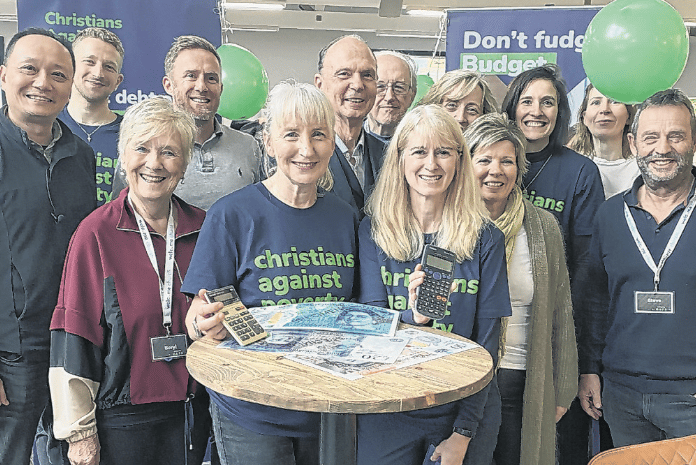Four-lettered words
Not all four-letter words are coarse or offensive. Many are just the opposite, such as Love, Hope, Help. And some four-lettered words are unpleasant: take Debt for example.
Debt is something surprisingly easy to get into and difficult to get out of.
Recently I was invited to a meeting, at the Welcome Church, of CAP to launch a campaign in Woking to help local people improve their finances in 2024. CAP stands for Christians Against Poverty, a national charity endorsed by Martin Lewis, the money guru who, in my daughters’ opinions, should be given sainthood, though I suspect a knighthood would be more easily sought for him by those who owe him a debt of gratitude.
For that is what if often comes down to – owing. CAP runs free courses to help people across the borough who are struggling with debt.
I spoke to Dub Everitt, the Welcome Church outreach pastor. He stressed that the work of CAP is to give people a hand up – not a hand out, and mentioned that old but very true, story of “give a man a fish and he’ll eat for a day – teach a man to fish, and he’ll eat for a lifetime”.
Current times are hard for many, including Woking Borough Council who have some hard decisions to make. The help offered by the church is for everyone in the borough, not just those in the congregation.
Welcome Works is an umbrella for all of their social activities aimed at giving help where it is needed. So the Welcome Church is delighted to pair with CAP with courses on money matters, debt, life skills, and job seeking. As Dub pointed out, being a church of around 1,000 people they have many who are passionate and committed to giving time to help see lives transformed.
The CAP Woking Debt Centres, based at Welcome Church and Christ Church, have supported over 500 local people and 158 have become debt-free, with a total of over £1.8 million of debts cleared.
I spoke to several people whose lives have been turned around by CAP. I asked them if the fact that this is a Christian group had put any of them off; had they worried they were going to be thrown in with a lot of “God botherers” who would only agree to assist them if they agreed to become regular churchgoers?
This, as I had thought, was not the case at all, as help is given to all religions and none. In fact religion does not matter in the slightest, apart from the fact that all the main religions teach that the poor should be helped.
Those I spoke to all underlined the importance of the help being given face-to-face; they did not have to fill out reams of information about themselves before getting “stuck into the things that mattered” as one put it.
Every CAP course leader is trained to a high standard so that they deliver high-quality information, guidance, and most importantly, help those who have sought them out.
It leads to high job search successes, and people are helped to become more able to manage their money and become free of debt.
The high standard of the various courses may be judged by the fact that the Job Club leader took early retirement from his work in recruitment for the gas and oil industry. The leader of the Money Coaching course freely gives his time and help: his day job is with Visa. All the volunteers give their time and experience to help people get back on their feet, and equip them for their future self-sufficient lives.
There was Sue who had been made redundant in her 50s. She became a job seeker but, with no transport, this brought further problems. Bus fares were expensive, even if a bus route of use to her could be located.
She could not get a bus pass as she was still of working age, and having no disability she could not use the Bustler either. There were no supermarkets within walking distance, only rather too expensive shops.
She told her bank of her problems and they suggested she use a credit card; most certainly not a solution in this case. She was directed to CAP some 15 years ago. They went through her finances with her, closing store cards as they were not saving her any money, and finding out just where cuts could be made, and benefits sought.
Sue told of the Job Club where you can gain skills or hone the skills you already have and perhaps don’t use in the best way. She underlined the fact, which others also mentioned to me, that however guilty and foolish you may feel about having got into debt, the helpers are in no way judgemental just understanding and, best of all, useful; the Money Management course simplifies that frightening state of affairs.
I heard mention of a family who had been rehoused to a place which was much better for all of them, apart from the fact that there were no buses on Sunday and the lady worked on a Sunday. Surely public transport, which must include bus routes, routes which actually have buses running on them at useful times, should be paramount in any housing developments.
Candy from Hong Kong had received help from the Job Club. She said that back in Hong Kong a CV would run to several pages setting down the values of the job seeker. In this country she was advised to cut it down to specifics, stating the skills she had, not setting out in detail her educational history and listing all the certificates held, however important they had seemed to her in the past. She now works for Surrey County Council, employed in a job she finds interesting and challenging.
Enza was a self-employed hairdresser pre-Covid and the pandemic, of course, closed down her business. Lockdowns hit her hard. Universal Credit helped, and her family helped, but this was another example of debt creeping up on someone who is desperate to work, not just some work-shy person finding it easier to live on benefits.
CAP courses helped her; “they gave me hope!” Which is, as I said, another four-letter word.
We protest!
It has been a long time since I was on a protest march. Was in 1992? Or was it 1913? I admit that I’ve been watching re-runs of Doctor Who; has something of the Time Lord rubbed off on me?
The 1992 march was organised by playwright Ann Jellicoe in the play she wrote specifically for Woking: Changing Places, enacted by members of the newly formed Woking Community Play Association.
Ann’s march echoed that of the suffragettes in Woking in 1913, and I was one of their number. The 1992 version that is.
I’ve not checked but I wonder if the statue of Dame Ethel Smyth, at Dukes Court, has been given a suitable protest placard to hold. After all, she was not only a militant suffragette but the local resident who composed the March of the Women for the suffragette movement.
So I did not feel out of place recently when I joined the band of protesters at the council offices. Indeed, I met one of my fellow suffragettes from 1992.
Women’s suffrage, having now been won, we had other bees in our bonnets: we were protesting about the cuts in funds in Woking, especially those to Citizens Advice Woking, although I noted that several other groups, worried about cuts in their services, had joined in with their placards declaring their interests.
One just stated “Toilets Closed” which was very much to the point and another reminder of Changing Places, where the local ladies had been shown to be delighted at the erection of a ladies’ toilet in central pre-First World War Woking.
The weather was bad: cold and wet, and yet there was a good turnout and the councillors entering the council offices were made well aware of the feelings of so many local residents.
Many of the groups in line to have funds severely cut, or removed, are those which deal with the people who need them most. Citizens Advice Woking (CAW) being, perhaps, the main one.
There are other centres which are, currently, offering help, respite, coffee, advice, chat, community and cake which are liable to suffer severe trimming, if not the chop.
The front page of the February 8 issue of the News & Mail showed just some of the cleverly worded placards concerning Citizens Advice Woking with the initial wording spelling out CAW.
One, held by an ex-mayor of Woking, succinctly puts it: “Citizens Advised Where?” Indeed, where does one go for advice if CAW is not here to help? Perhaps the best placard offered advice to WBC itself: “ WBC Should’ve Come to Us for Advice!” Another, doom-laden, placard declared: “1 Day’s Debt Interest = 1 Year’s Funding!”
So why didn’t WBC take advice on its finances? Such advice, from CAW, would have helped put the brakes on the council’s speeding train of debts earlier.
Too late now? Is it ever too late? Can there be hope? Or is that glimmer of light at the end of the tunnel just the council’s goods service loco on the wrong track, bearing down on us with a pile-up in the offing?
Let us hope we are all around to find out if the ending is a happy one or not. Anything short of disaster would be welcome.



.jpeg?width=209&height=140&crop=209:145,smart&quality=75)

Comments
This article has no comments yet. Be the first to leave a comment.